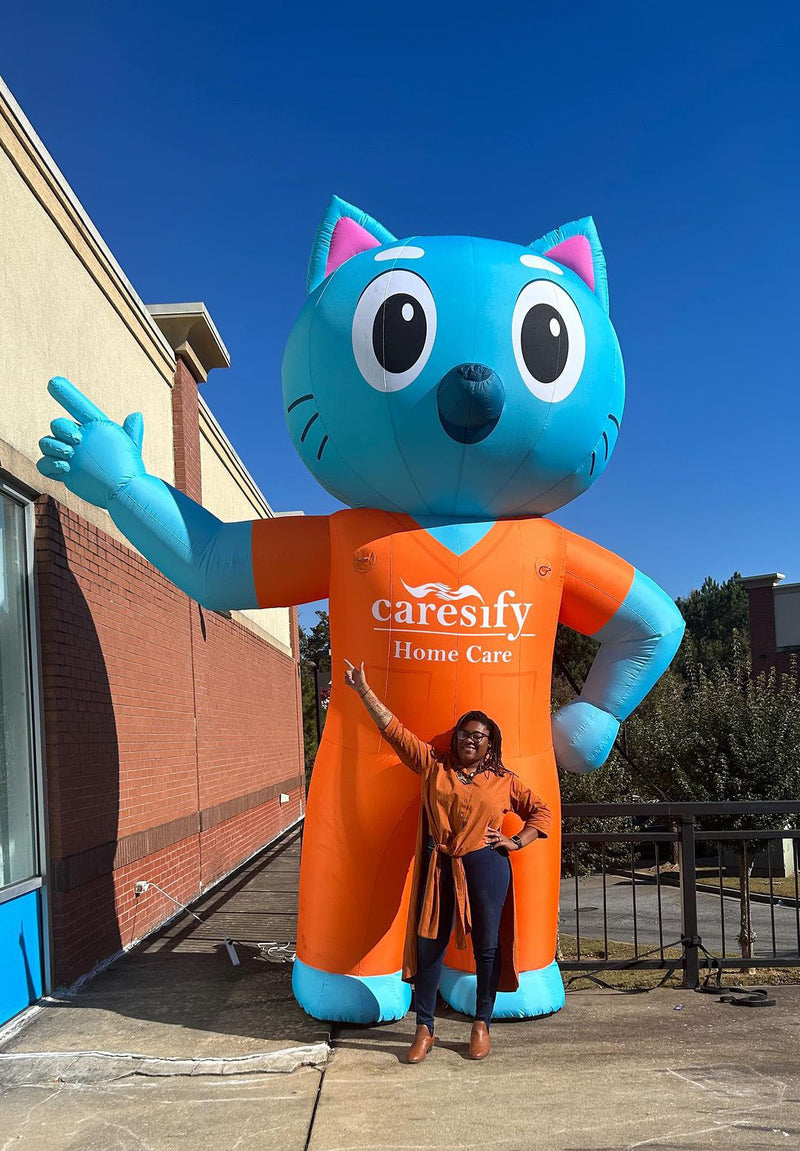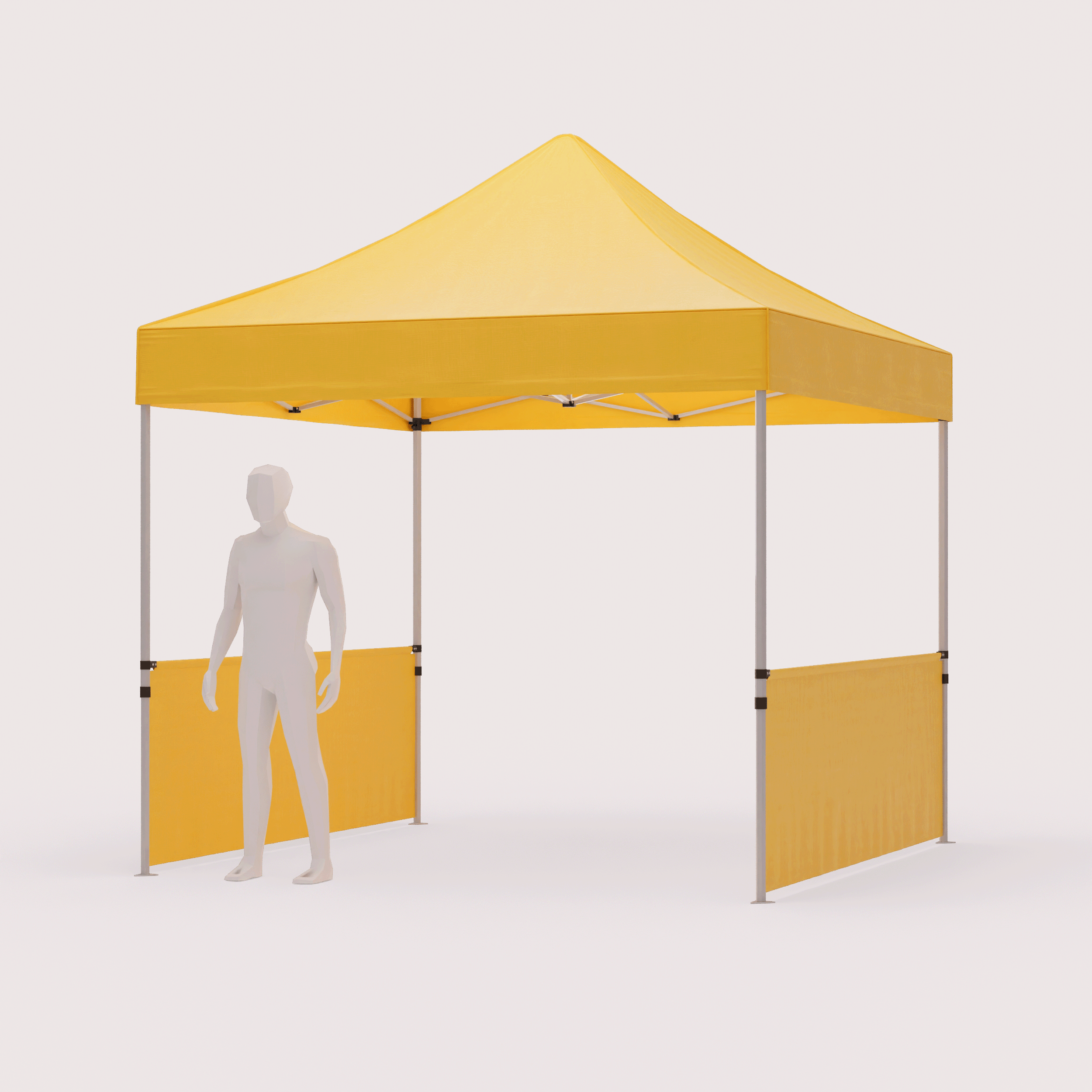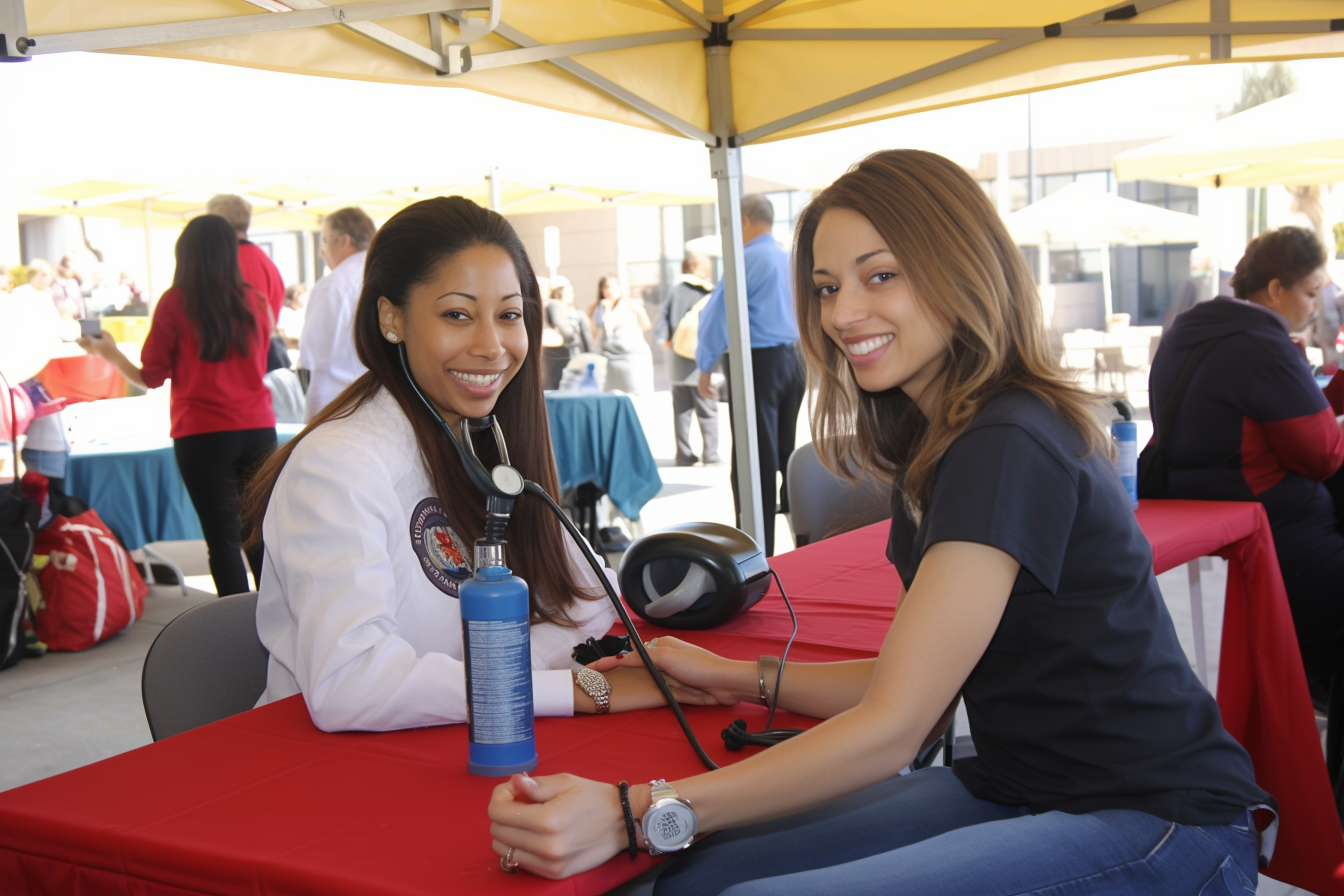Looking to host a health fair that not only draws a crowd but also educates and inspires?
Health fairs are crucial for promoting wellness and providing valuable health insights to the public. But pulling off a successful event requires meticulous planning, engaging activities, and the right setup, from health fair tents and booths to interactive stations.
In this comprehensive guide, we’ll walk you through essential health fair ideas, from fitness challenges and nutrition workshops to health screenings and interactive activities. Whether you're a healthcare professional, community leader, or school administrator, these tips will help you create an impactful event.
 Make your health fair a hit with our fun inflatable mascots, perfect for drawing crowds and snapping great photos.
Make your health fair a hit with our fun inflatable mascots, perfect for drawing crowds and snapping great photos. Customize Inflatable Mascot
Fitness and Physical Activity Ideas

1. Interactive Fitness Demos
- Yoga Sessions: Offer yoga classes that cater to all fitness levels, ensuring the instructor can modify poses for beginners and advanced participants. Provide yoga mats and set up multiple sessions throughout the day to accommodate different schedules. Using a calm, serene space can enhance the experience and draw more attendees.
- Cardio Dance Classes: Implement high-energy dance classes like Zumba with an enthusiastic instructor who can create a fun, party-like atmosphere. Use a robust sound system for clear, motivating music. Consider scheduling these sessions at peak times to maximize participation.
- Martial Arts Demonstrations: Conduct martial arts demos focusing on self-defense techniques and basic moves. Make the sessions interactive by allowing attendees to practice simple techniques under instructor supervision. This hands-on approach can make the activity more engaging and educational.
2. Fitness Challenges
- Step Counting Challenge: Provide pedometers or use a mobile app to track steps, encouraging friendly competition. Announce periodic updates and reward top steppers with small prizes to maintain excitement. This ongoing challenge can keep attendees engaged throughout the event.
- Obstacle Course: Design a safe, fun obstacle course suitable for all fitness levels. Offer small rewards for completing the course or achieving the fastest times. This not only adds a competitive element but also encourages physical activity in an enjoyable way.
- Jump Rope Competition: Host a jump rope competition with different categories like longest continuous jump or most jumps in a minute. Provide jump ropes and ensure there are ample breaks between rounds to keep participants energized and motivated.
3. Group Exercise Classes
- Pilates: Organize Pilates classes that focus on core strength and flexibility. Ensure the instructor can offer modifications for varying fitness levels to keep everyone engaged. Position the class in a quiet, comfortable area to enhance focus and participation.
- Tai Chi: Schedule Tai Chi sessions that emphasize slow, deliberate movements and breath control. These sessions are particularly appealing to older adults or those new to exercise. Hosting these classes in a serene, quiet space can improve the overall experience.
- Mini Bootcamp Classes: Offer short, high-intensity bootcamp workouts combining strength training and cardio. Keep sessions around 20-30 minutes to fit into attendees' schedules while providing an effective workout. Ensure the instructor can adjust exercises for different fitness levels to keep everyone involved.
Health Screenings and Assessments Ideas
4. Basic Health Screenings
- Blood Pressure Checks: Provide stations where attendees can get their blood pressure checked by healthcare professionals. This simple screening offers valuable insights into cardiovascular health. Ensure that staff explain the results and provide guidance on maintaining healthy blood pressure levels. To create a comfortable and private setting, consider setting up a custom canopy tent so attendees feel at ease during the screening.
- Cholesterol Testing: Offer cholesterol tests to help detect risk factors for heart disease. Partner with local healthcare providers to conduct these screenings and provide immediate feedback. Enhance the experience by providing educational materials on diet and lifestyle changes to manage cholesterol levels.
- Blood Sugar Monitoring: Set up stations for blood sugar testing to help attendees understand their risk for diabetes. Ensure professionals are available to explain results and offer advice on managing blood sugar through diet and exercise.
5. Body Composition Analysis
- BMI Measurements: Use tools to measure Body Mass Index (BMI) and provide attendees with their results. Explain the implications of BMI on overall health and offer tips for maintaining a healthy weight. This can be a good starting point for discussions about nutrition and physical activity.
- Body Fat Analysis: Offer body fat percentage analysis using bioelectrical impedance devices. This can give attendees a better understanding of their body composition and health. Pair this with educational sessions on how to improve body composition through exercise and diet.
- Waist-to-Hip Ratio: Measure waist-to-hip ratios to help attendees understand their body shape and associated health risks. Provide information on how waist-to-hip ratio can be an indicator of cardiovascular health and offer tips for achieving a healthier ratio.
6. Specialized Health Screenings
- Vision and Hearing Tests: Collaborate with local optometrists and audiologists to offer vision and hearing screenings. These tests can help identify issues that attendees might not be aware of and prompt them to seek further medical advice if needed.
- Bone Density Testing: Provide bone density tests to help attendees assess their risk for osteoporosis. This is particularly valuable for older adults and can be coupled with educational materials on maintaining bone health through diet and exercise.
- Skin Cancer Screenings: Partner with dermatologists to offer skin checks for early signs of skin cancer. This can be an important preventive measure and raise awareness about sun safety and skin health.
Nutrition and Wellness Education Ideas

7. Nutrition Workshops
- Healthy Cooking Demonstrations: Host live cooking demos that showcase how to prepare healthy meals. Use fresh, easily accessible ingredients and provide recipes for attendees to take home. Encourage interaction by allowing participants to taste samples and ask questions about cooking techniques and nutrition.
- Meal Planning Sessions: Offer workshops on how to plan balanced and nutritious meals. Provide practical tips on grocery shopping, meal prepping, and portion control. Include handouts with sample meal plans and shopping lists to help attendees implement what they learn.
- Reading Nutrition Labels: Educate attendees on how to read and understand nutrition labels. Highlight key information like serving sizes, calorie counts, and nutrient content. Use real product examples to make the session more interactive and practical.
8. Healthy Eating Education
- Dietary Guidelines Overview: Present the latest dietary guidelines and explain how they can be applied to daily eating habits. Use visual aids like food pyramids or MyPlate diagrams to illustrate balanced eating. Provide handouts summarizing the guidelines for attendees to reference later.
- Superfoods and Their Benefits: Conduct sessions on the health benefits of various superfoods. Highlight nutrient-rich foods like berries, leafy greens, nuts, and seeds. Provide recipes and samples to make the session engaging and informative.
- Interactive Nutrition Games: Organize games and activities that teach healthy eating concepts. For example, set up a “build a balanced plate” game where participants choose foods to create a nutritious meal. Use these activities to reinforce learning in a fun and memorable way.
9. Lifestyle and Wellness Education
- Stress Management Techniques: Offer workshops on managing stress through diet, exercise, and mindfulness. Teach attendees about the impact of stress on health and practical strategies to reduce it. Include guided relaxation exercises or short mindfulness practices.
- Sleep Hygiene: Educate attendees on the importance of sleep and how to improve sleep quality. Cover topics like creating a bedtime routine, managing screen time, and optimizing the sleep environment. Provide handouts with tips and recommendations.
- Hydration and Health: Highlight the importance of staying hydrated and the health benefits of proper hydration. Discuss how much water is needed daily and the signs of dehydration. Provide water bottles or hydration tracking tools as giveaways to encourage participants to stay hydrated.
 Our 10x10 custom canopy offers essential shade and makes your health fair booth a focal point.
Our 10x10 custom canopy offers essential shade and makes your health fair booth a focal point.Shop Branded 10x10 Canopies
Competitions and Interactive Activities Ideas
10. Healthy Competitions
- Healthy Recipe Contest: Invite attendees to submit their favorite healthy recipes before the event. Display the recipes at the fair and have a panel of judges or the attendees vote on the best ones. Winners can receive cookbooks or kitchen gadgets as prizes.
- Fitness Challenge Stations: Set up various fitness challenge stations like push-ups, sit-ups, and planks. Participants can compete to see who can perform the most repetitions or hold a position the longest. Offer small rewards for top performers. To keep activities organized and shaded, designate a large 10x20 canopy tent as the main hub for these challenges. This not only provides comfort from the sun but also creates a clear focal point where attendees can gather and cheer on participants.
- Hydration Challenge: Encourage attendees to track their water intake throughout the event. Provide water bottles and challenge participants to meet a specific hydration goal by the end of the fair. Recognize those who achieve the goal with small prizes.
11. Interactive Games and Activities
- Nutrition Label Scavenger Hunt: Create a scavenger hunt where participants search for and identify healthy food choices based on nutrition labels. This interactive game teaches attendees how to read labels while making the activity fun and engaging. Offer small prizes for those who complete the hunt successfully.
- Wellness Wheel Spin: Set up a prize wheel where attendees can spin to win wellness-related items such as fitness gear, healthy snacks, or vouchers for wellness services. To make the station more eye-catching and professional, place the wheel on a table with a custom printed table cover featuring your event or sponsor branding. This not only enhances visibility but also reinforces your event’s theme while adding an element of surprise and excitement to the fair.
- Health Trivia Quiz: Host a trivia quiz focusing on health and wellness topics. Participants can compete individually or in teams, answering questions related to nutrition, fitness, and general health. Offer small prizes for top scorers to encourage participation.
12. Fun and Engaging Activities
- Healthy Smoothie Station: Set up a station where attendees can create their own healthy smoothies using fresh ingredients. Provide recipes and nutritional information to educate participants on the benefits of each ingredient.
- Guided Nature Walks: Organize short nature walks around the event venue, led by a guide who can talk about the health benefits of spending time outdoors and staying active.
- Mindfulness and Relaxation Zone: Set up a quiet area with comfortable seating where attendees can practice mindfulness and relaxation techniques. Provide guided meditation sessions, stress relief activities, and information on mental wellness.
Family and Community Engagement Ideas

13. Family-Friendly Activities
- Kids' Fitness Zone: Set up a dedicated area for children with activities like obstacle courses, hopscotch, and mini yoga sessions. These activities can keep children engaged and active while their parents participate in other parts of the health fair. Provide supervision and ensure the activities are safe and age-appropriate.
- Healthy Snack Stations: Create stations where families can make healthy snacks together. Provide ingredients and recipes for simple snacks like fruit kabobs, veggie cups with hummus, or yogurt parfaits. This can be both educational and fun, encouraging healthy eating habits in a family-friendly environment.
- Craft and Activity Booths: Include booths with health-related crafts and activities for kids, such as coloring sheets about healthy foods, building models of the human body, or making health-themed bracelets. These booths can help educate children about health in an engaging and interactive way.
14. Community Health Resources
- Local Health Organization Booths: Invite local health organizations, such as hospitals, clinics, and non-profits, to set up informational booths. These organizations can provide valuable resources, offer free health screenings, and share information about their services. This helps attendees connect with community health resources and gain access to important information.
- Mental Health Awareness Booths: Set up booths dedicated to mental health education and resources. Provide information on recognizing signs of mental health issues, coping strategies, and where to seek help. Partner with local mental health organizations to offer on-site counseling sessions or workshops on stress management and mindfulness.
- Public Health Workshops: Host workshops led by local public health officials or experts on topics relevant to the community, such as disease prevention, emergency preparedness, or mental health awareness. These workshops can provide valuable information and empower attendees to take an active role in their health and well-being.
15. Community-Building Activities
- Health Fair Parade: Organize a parade featuring local schools, community groups, and health organizations. Participants can create floats or banners that promote health and wellness. This can draw in a larger crowd and create a festive atmosphere.
- Fitness Flash Mobs: Plan surprise flash mobs with simple fitness routines that attendees can join in. Announce the time and location of the flash mob beforehand to generate excitement. This can be a fun way to engage the community and promote physical activity.
- Community Health Pledge Wall: Set up a large wall where attendees can write down their health goals or pledges. This interactive activity encourages people to think about their health and make commitments to improve it. Provide markers and sticky notes for people to add their pledges, creating a colorful and inspiring display.
 A custom tablecloth is essential for making your health fair booth stand out, showcasing your brand, and drawing in visitors.
A custom tablecloth is essential for making your health fair booth stand out, showcasing your brand, and drawing in visitors.Shop Custom Tablecloth
Technology and Innovation Ideas

16. Telehealth Demonstrations
- Virtual Doctor Visits: Set up stations where attendees can experience a simulated virtual doctor visit. Use telehealth platforms to demonstrate how easy and accessible remote healthcare can be. Provide information on the benefits of telehealth, such as convenience, reduced travel time, and access to specialists.
- Telehealth Consultations: Offer real-time telehealth consultations with healthcare professionals. Attendees can ask questions about their health, receive advice, and learn how to use telehealth services for future medical needs. This hands-on experience can demystify the technology and encourage its use.
- Remote Monitoring Devices: Showcase devices that allow for remote monitoring of health conditions, such as blood pressure cuffs, glucose monitors, and fitness trackers. Demonstrate how these devices can transmit data to healthcare providers and help manage chronic conditions more effectively.
17. Health Apps and Wearables Showcase
- Fitness and Health Apps: Set up booths where attendees can explore and try out various health and fitness apps. Provide demonstrations on how to use these apps for tracking workouts, managing diet, and monitoring health metrics. Offer recommendations based on attendees' health goals.
- Wearable Technology: Display the latest in wearable technology, such as smartwatches, fitness bands, and health monitors. Allow attendees to try on devices and see how they track health data in real-time. Provide information on how wearables can motivate users to stay active and monitor their health.
- App Development Workshops: Host workshops on developing health-related apps. Invite local developers or tech companies to share insights on app creation, from concept to launch. This can inspire tech-savvy attendees to create their own health apps.
18. Innovative Health Technologies
- 3D Printing in Healthcare: Demonstrate how 3D printing technology is being used in healthcare for creating prosthetics, custom medical devices, and anatomical models. Show examples and explain the impact of this technology on personalized medicine.
- Virtual Reality Health Simulations: Set up VR stations where attendees can experience health simulations, such as virtual surgeries, physical therapy exercises, or stress-relief environments. VR can provide immersive learning experiences and highlight innovative uses of technology in healthcare.
- AI in Healthcare: Showcase applications of artificial intelligence in healthcare, such as AI-driven diagnostic tools, personalized treatment plans, and virtual health assistants. Provide demonstrations and explain how AI can improve healthcare outcomes and efficiency.



